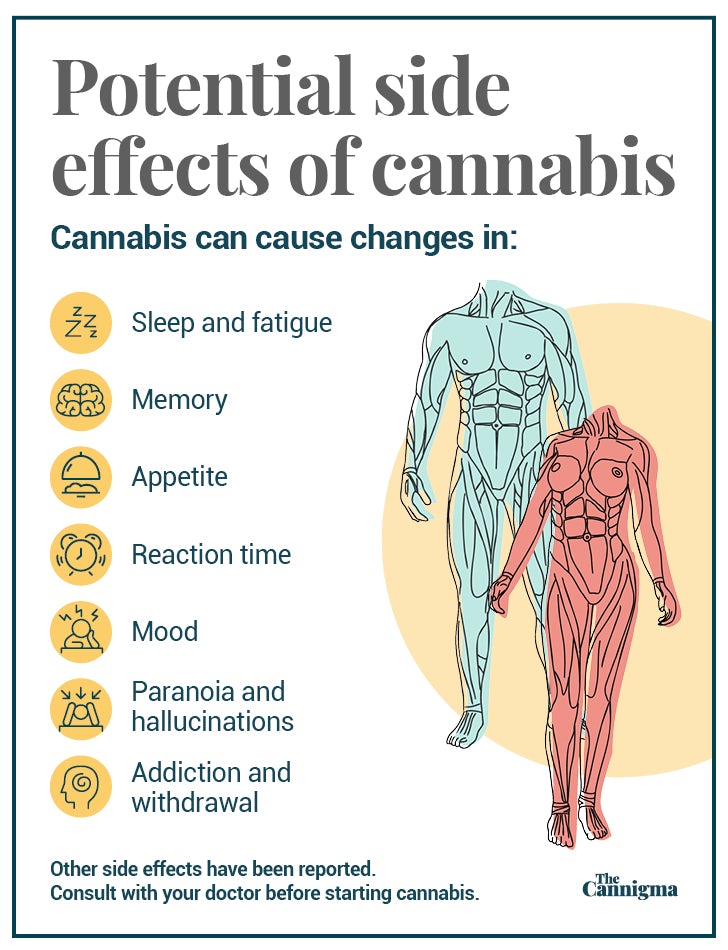Overview
The use of cannabis as a part of treatment for schizophrenia is a topic of much debate. On one hand, research indicates that cannabis use, particularly during adolescence, is associated with an increased risk of schizophrenia. On the other hand, there is research showing that the cannabinoid CBD may have antipsychotic effects.
These findings point to the involvement of the body’s endocannabinoid system in schizophrenia and the potential of CBD-rich strains or CBD-only cannabis preparations to improve the condition.
Here’s what the research says about the link between the endocannabinoid system and schizophrenia, and the ways in which CBD-rich cannabis may be able to help.
How Cannabis Works on Schizophrenia
The endocannabinoid system (ECS) exists in all vertebrates and helps regulate crucial functions such as sleep, pain, and appetite. The human body produces its own cannabinoids, which modulate and activate its various functions, but as its name suggests, the endocannabinoid system can also be modulated and activated by cannabinoids found in the cannabis plant. Because the entire system was only discovered in the past 30 years, scientists still have much to learn about the myriad ways cannabis affects the human body.
The cannabis plant contains active compounds called cannabinoids. THC and CBD are the best known as well as the most abundant.
The key difference between the two is that THC is psychotropic, which means it causes the mind-altering high attributed to cannabis, whereas CBD is non intoxicating. THC, CBD, and other cannabinoids can influence our health by interacting with the ECS.
Recent research points to the involvement of the ECS in psychosis and schizophrenia. In particular, early human studies suggest that the levels and function of endocannabinoids and cannabinoid receptors are altered in schizophrenia.
For example, a 2003 study found that people with schizophrenia had less CB2 receptors and higher levels of the endocannabinoid anandamide. Remission resulted in a decrease of anandamide.
Similarly, a 2013 study reported reduced levels of CB2 receptors and the two main enzymes (NAPE and DAGL) that build endocannabinoids in people who experienced their first episode of psychosis.
Meanwhile, several studies have highlighted that certain variations of cannabinoid receptor genes are associated with an increased risk of schizophrenia, meaning that some people are genetically predisposed to developing the condition.
One 2002 study found that a specific variation of the CB1 gene was associated with an increased risk of schizophrenia. Similar findings were reported by 2006 and 2008 studies of the CB1 gene.
A 2010 study of healthy individuals and those with schizophrenia revealed that people with a genetic variation resulting in reduced CB2 receptor function were more likely to have the condition.
Finally, numerous postmortem and neuroimaging studies report that people with schizophrenia have increased CB1 receptor levels in certain regions of the brain. This finding is particularly interesting because it may help explain why the use of cannabis with high levels of THC, a cannabinoid that binds to CB1 and the main one responsible for cannabis’s mind-altering effects, also causes susceptible individuals to develop or worsen psychotic symptoms.
Taken together, these findings suggest that altered ECS function may be involved in schizophrenia and make people susceptible to developing the disorder. However, they also reveal the promise of using cannabinoids — and CBD in particular — to treat schizophrenia.
Medical Studies on Cannabis and Schizophrenia
Research suggests that the effectiveness of cannabis in treating schizophrenia depends largely on the THC and CBD levels of the given preparation.
Some studies show that THC promotes psychotic symptoms. This may explain why many other studies have concluded that there’s a strong link between smoking strains of cannabis with lots of THC (marijuana) and the worsening or development of schizophrenia.
In sum, there is a growing body of evidence that THC-rich cannabis can worsen psychotic symptoms, but that as a 2013 review paper puts it, “there is mounting evidence supporting the therapeutic use of CBD to treat schizophrenic symptoms.”
CBD and Schizophrenia
CBD does not have the psychotropic effects of THC, and is thus often widely-available in jurisdictions where medical marijuana has not been legalized.
- One indication of the therapeutic potential of CBD was a 1995 case mentioned in a 2013 review paper, which described a 19-year-old schizophrenic girl whose symptoms improved significantly by taking high daily doses of CBD. The study also asserted that “behavioural and neurochemical models suggest that CBD has a pharmacological profile similar to that of atypical antipsychotic drugs and a clinical trial reported that this cannabinoid is a well-tolerated alternative treatment for schizophrenia.”
- A 2012 clinical study reported that CBD improved psychotic symptoms in schizophrenia sufferers as effectively as the antipsychotic medication amisulpride, but with fewer side effects, “potentially representing a completely new mechanism in the treatment of schizophrenia.”
- Most notably, a 2017 clinical study found that patients treated with CBD saw a reduction of psychotic symptoms, improvement in cognitive function, and increased likelihood of being rated as improved by their doctor. Also, CBD did not cause any significant side effects in the study.
- A more recent case report presented a 57-year-old treatment resistant patient with a 21-year history of schizophrenia. The patient suffered from severe hallucinations that were significantly reduced through CBD treatment. Nevertheless, this is anecdotal evidence and further randomized controlled trials should be done.
Lastly, multiple animal studies have demonstrated the antipsychotic benefits of CBD.
Potential side effects of cannabis use
THC-heavy cannabis preparations can worsen psychosis and schizophrenia. Other potential side effects include impaired memory and reaction time, increased heart rate, anxiety, paranoia, red eyes, dry mouth, sleepiness, dizziness, and fatigue.
By comparison, CBD is antipsychotic and has even been shown to counteract the psychoactive consequences of THC. However, preparations that contain mainly CBD may cause minor issues such as diarrhea, low blood pressure (hypotension), dry mouth, lightheadedness, sleepiness, and fatigue.

Sign up for bi-weekly updates, packed full of cannabis education, recipes, and tips. Your inbox will love it.

 Shop
Shop Support
Support